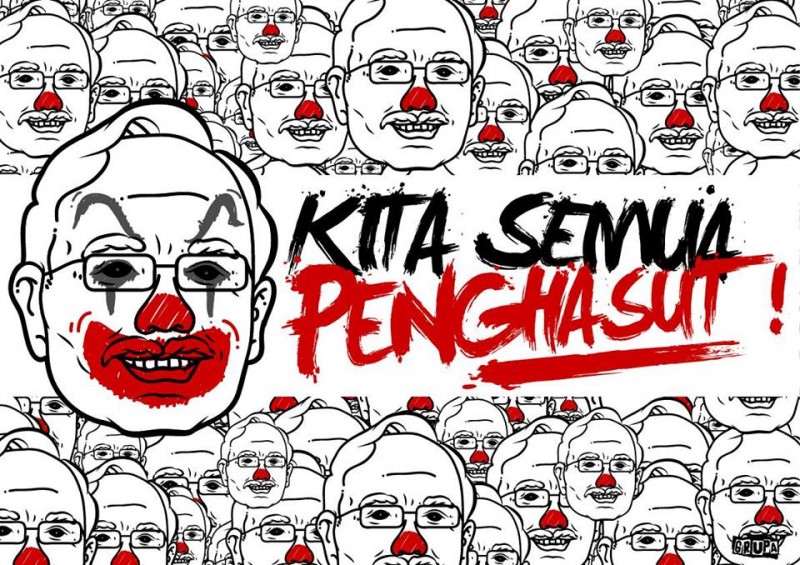On January 31, 2016, artist Fahmi Reza [4] posted a tweet denouncing the Sedition Act [5], accompanied by a clown image of Najib.
In 2015, the Sedition Act was used 91 times. Tapi dalam negara yang penuh dengan korupsi, kita semua penghasut. pic.twitter.com/OSwbxFxYSF [6]
— Fahmi Reza (@kuasasiswa) January 31, 2016 [7]
In 2015, the Sedition Act was used 91 times. But in a country full of corruption, we are all seditious.
The Sedition Act is a colonial-era law which has been used [8] by successive governments to silence and arrest the opposition and other critical voices in Malaysia. Najib promised to repeal the law in 2012 but instead of doing this after winning a new term as prime minister, he urged parliament to strengthen the measure by citing the need to improve national security.
After Fahmi Reza posted the tweet, he got a quick reply from the Police Cyber Investigation Response Center [9] through Twitter:
AccTwitter @kuasasiswa [10], acc anda dibwh pengawasan PDRM.Gunakan dgn berhemah&berlandaskan undang2.@KBAB51 [11] @PDRMsia [12] pic.twitter.com/2SJ5ABEYkc [13]
— PCIRC OFFICIAL (@OfficialPcirc) January 31, 2016 [14]
You are now under police watch. Use your account responsibly and according to the law.
Friends of Reza from the Grafik Rebel Untuk Protes & Aktivisme (Grupa), or Rebel Graphics for Protests & Activism, immediately accused [15] the police of harassment. They started a campaign urging the public to post [16] clown photos of Najib in support of Reza. The hashtag #kitasemuapenghasut [17], which means ‘we are all seditious’, was used and instantly became popular in Malaysia.
In a Facebook post, Fahmi Reza defended [18] parody and satire as a form of artistic expression:
In a country where cartoonists and satirists have been censored, intimidated, arrested and incarcerated for their art, it is important that this vital form of artistic expression – parody and satire as a form of political protest – is continued to be practiced and to be defended at all costs.
Perhaps to stop netizens from sharing the clown images of Najib, a government agency warned [19] the public that those guilty of humiliating national leaders can face prosecution.
This elicited another reply [20] from the artist:
I designed the warning poster, as a piece of political satire and parody to highlight the absurdity behind the warning issued by the police against spreading the clown pictures; which is a form of internet censorship that goes against internet freedom.
The human rights group Suaram urged [21] the government not to equate satire with crime:
Recalling the nature of office hold [sic] by any government official, public scrutiny and criticism is [sic] part of the democratic process that serves as the foundation of Malaysia. Satirical images and comments made against government official[s] should not be considered as a crime.
Here are some of the clown memes of Najib that were shared by the graphic artist collective, Grupa:
Ladies and gentlemen, we present to you, our Clown-in-Chief. #KitaSemuaPenghasut [22] #grafikrebel [23] pic.twitter.com/DIJr0e58kE [24]
— GRUPA (@grafikrebel) February 3, 2016 [25]
May the force be with you? #KitaSemuaPenghasut [22] #WeAreAllSeditious [26] #GrafikRebel [27] #Grupa [28] pic.twitter.com/nnJWnlxtxD [29]
— GRUPA (@grafikrebel) February 12, 2016 [30]
Who hired this clown? #KitaSemuaPenghasut [22] #WeAreAllSeditious [26] #GrafikRebel [27] #Malaysia [31] #LaughterIsMedicine [32] #BadutNegara [33] pic.twitter.com/hSlNhQZ7JK [34]
— GRUPA (@grafikrebel) February 9, 2016 [35]
Send out the clown! #KitaSemuaPenghasut [22] #GRUPA [36] #GrafikRebel [27] #MalaysiaProtestArt [37] #Jibby [38] pic.twitter.com/p3dxLf4nzb [39]
— GRUPA (@grafikrebel) February 8, 2016 [40]
Sometimes laughter is most subversive weapon of all. #KitaSemuaPenghasut [22] pic.twitter.com/4UGdZDmPtm [41]
— GRUPA (@grafikrebel) February 4, 2016 [42]
One tweet referred to a corruption [43] scandal involving Najib, who is accused of receiving 600 million US dollars from a state-run investment firm. Najib claimed the money in his personal bank account is a political donation from a royal family in Saudi.
Hail to the King of Donation. #KitaSemuaPenghasut [22] pic.twitter.com/O3aLUXK6oO [44]
— GRUPA (@grafikrebel) February 7, 2016 [45]
Another reminded people of Najib's 2012 election pledge to repeal the Sedition Law:
Eating his words or biting his tongue? #KitaSemuaPenghasut [22] #grafikrebel [23] pic.twitter.com/8vGsiwfQ60 [46]
— GRUPA (@grafikrebel) February 2, 2016 [47]
